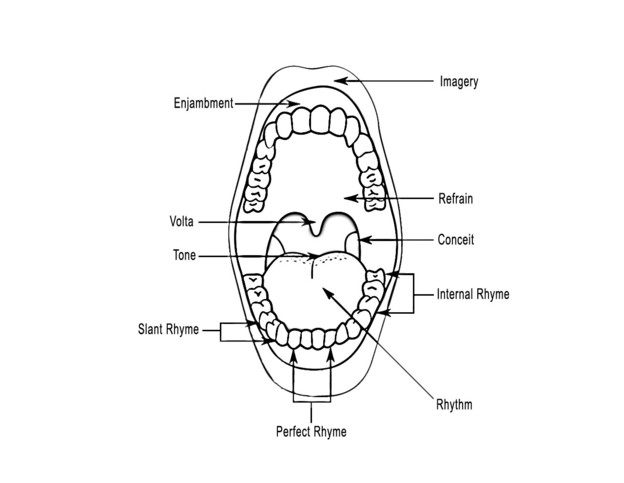At the opening

The mouth opens. It burps and yowls, gasps and laughs, mumbles and yawns. The mouth sings —loudly or quietly and can do it with a shimmer. The mouth whispers. The mouth SCREAMS. The mouth speaks, stutters, and stops.
As a site of expression for audible linguistic and extralinguistic soundings, the mouth is a powerful apparatus for vocalized meaning-making. It can make the self and community; it can bridge and break both of those things. In Lexicon of the Mouth: Poetics and Politics of Voice and the Oral Imaginary (2015), artist and writer Brandon LaBelle describes the mouth as a “contact zone where language performs as a powerful agent” that figures the subject as an autonomous being and that being within a network of relation.[1] For LaBelle, to speak aloud and to be heard is to be deeply connected in dialogue with another; it is to be part of an intimate exchange that travels between the deep and unseen recesses of bodies. “I am interested in hearing the voice as a performative event that calls forth an essential animating and corporeal dynamic,” writes LaBelle, “while at the very same time remaining vulnerable to the intrusions of another; of silence and noise; and the interventions of the foreign; of rupture and loss, as well as love and sexuality; and the powers of discourse.”[2]
Italian theorist and feminist thinker Adriana Cavarero also investigates the relationship between voice and the production of the subject in her For More than One Voice: Toward a Philosophy of Vocal Expression (2005). Cavarero is thinking toward what she refers to as a “vocal phenomenology of uniqueness.”[3] Part of Cavarero’s project is to distinguish the voice from the strictures of logocentricism because otherwise it “radically denies to the voice a meaning of its own that is not always already destined to speech.”[4] In other words, Cavarero wants to examine the voice as sound, not speech. The sound of the voice, she suggests, “communicates the elementary givens of existence: uniqueness, relationality, sexual difference, and age,” which are among the elements of human identity and that human’s integration into the mesh of social belonging.[5] Alongside Labelle’s and Cavarero’s examinations of the mouth, I am interested in both the phenomenological aspects of the voice and how the voice defines and is defined by the contours of the social imaginary.
As a historically oral art form, poetry is a generative site for investigating the intersections proposed above: the mouth as it chews, spits, swallows, and shapes the imaginary during vocal audition. Such poetries take the form of short and durational performances; audio and video recordings; improvisations; interdisciplinary collaborations; and other forms of experimentation. There are many exemplary poets exploring these various modalities across temporal, geographical, and cultural contexts. This commentary series will primarily read and listen to the poetry of practitioners working within the area lines of Canada. In addition to being the immediate literary context which I engage, arrange, and am arranged by daily, there is a vibrant cast of authors whose works variously engage the social, cultural, and political domains of Canadian literary discourse (and beyond), including Lillian Allen, Christan Bök, Gerry Shikatani, Jordan Scott, Maria Campbell, and others. They raise a number of important questions that compel my investigations: How do oral poetries participate in meaning-making activities and the production of national belonging? In what ways do outside forces — economic, social, technological, and political — shape the formation of poetry and its communities? In what ways do oral poetries support or oppose dominant ideological and hegemonic positions produced by networks of power in Canada, especially Canada’s networks of literary power?
This commentary series is animated by such questions and I will think toward possible answers, further problems, and routes of circumvention around these issues. I will come to these questions looking for answers while at other times I will leave them aside altogether. If vocalization is a means for establishing a relation between poet and listener — communal or individual, private or public —then, over the course this series, I hope to highlight how some poets who are performing from the mouth divergently enforce and trouble formations of the social imaginary in Canada.
1. Brandon LaBelle, Lexicon of the mouth: Poetics and Politics of the Voice and Oral Imaginary (London: Bloomsbury, 2015), 2.
3. Adrianna Cavarero, For More than One Voice: Toward a Philosophy of Vocal Expression, (Stanford: Stanford University Press, 2005), 7.
Poetries of the Mouth and Canadian Imaginary